<< Previous | Displaying results 6451-6500 of 6768 for "" | Next >>
April 25, 1945. On this date, Soviet and American troops met at Torgau, Germany.
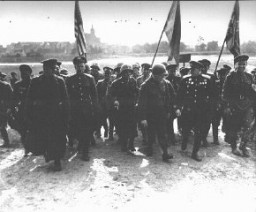
April 30, 1945. On this date, Adolf Hitler committed suicide in his Berlin bunker.
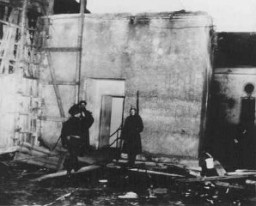
September 2, 1945. On this date, Japan signed their surrender aboard the USS Missouri and ended World War II.
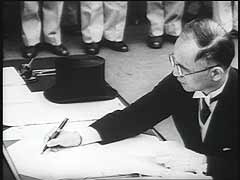
December 22, 1945. On this date, Harry S. Truman issued a directive giving US immigration preference to displaced persons.
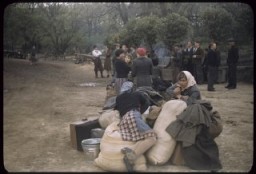
April 11, 1945. On this date, the US Army liberated the Dora-Mittelbau (Nordhausen) concentration camp in Germany.
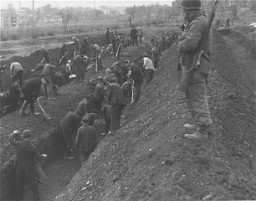
July 23, 1944. On this date, Soviet forces liberated the Lublin/Majdanek concentration camp in Poland.
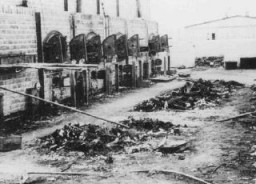
November 29, 1945. On this date, the International Military Tribunal prosecution presented a film titled "The Nazi Concentration Camps."
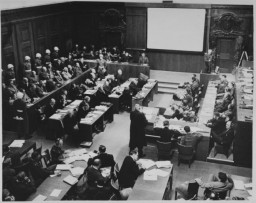
November 21, 1945. On this date, Robert H. Jackson delivered opening statements at the International Military Tribunal in Nuremberg.
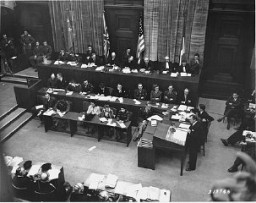
April 23, 1945. On this date, US forces liberated the Flossenbürg camp in Germany.
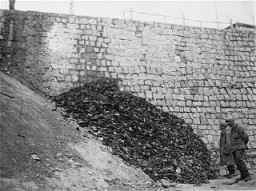
April 30, 1945. On this date, Soviet forces arrived at Ravensbrück concentration camp in Germany.
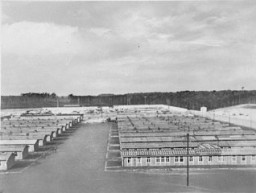
May 4, 1945. On this date, the SS troops evacuated approximately 9,000 prisoners from Neuengamme in advance of the British troops' approach.
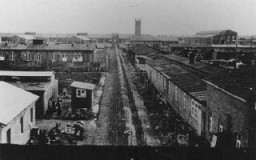
May 5, 1945. On this date, US troops liberated Mauthausen concentration camp. Days before, a group of prisoners took control of Mauthausen.
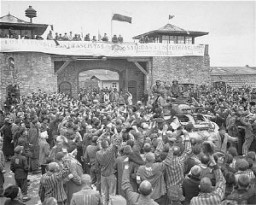
April 27, 1945. On this date, US soldier Aaron A. Eiferman wrote a letter to his wife describing conditions in Kaufering IV in Germany.
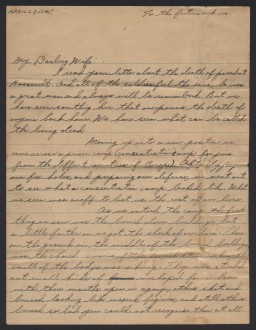
May 4, 1945. On this date, the US Army liberated Gunskirchen, a subcamp of Mauthausen in Austria.
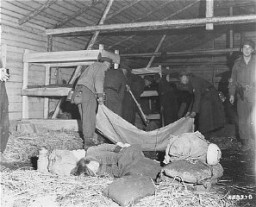
January 16, 1944. On this date, Franklin D. Roosevelt and Henry Morgenthau Jr. met to discuss the rescue of European Jews.
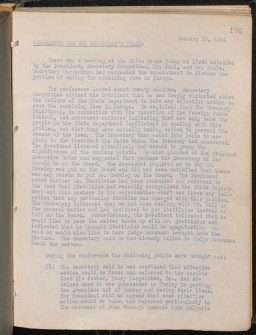
December 11, 1945. On this date, the film "The Nazi Plan" is shown as evidence at the International Military Tribunal at Nuremberg.
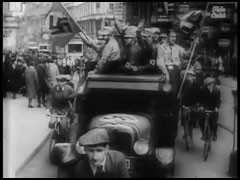
February 4-11, 1945. On this date, Allied power leaders met at Yalta in the Soviet Union to discuss the postwar order.
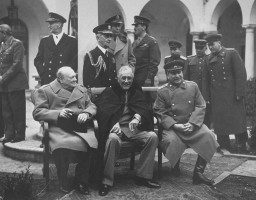
July 4, 1946. On this date, there was a massacre of Jews in Kielce, Poland.
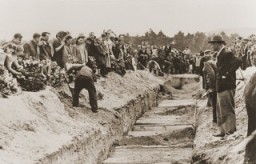
October 1, 1946. On this date, the International Military Tribunal sentenced 12 Nazi officials to death.
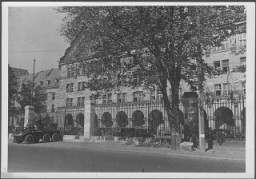
November 5, 1988. On this date, the US ratified the UN Convention on the Prevention and Punishment of Genocide.
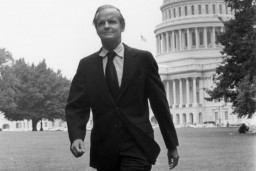
July 17, 1998. On this date, the Rome Statute established the International Criminal Court, a permanent judicial body to try genocide and war crimes.
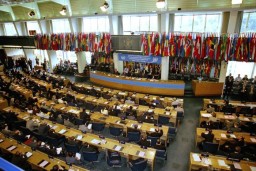
September 2, 1998. On this date, the International Criminal Tribunal for Rwanda found Jean-Paul Akayesu guily of genocide and crimes against humanity.
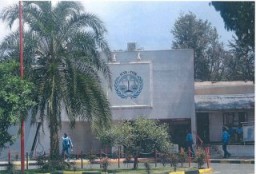
September 9, 2004. On this date, Colin Powell labelled the events in Darfur as "genocide."
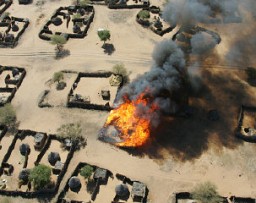
January 12, 1951. On this date, the United Nations Convention on the Prevention and Punishment of Genocide entered into force.
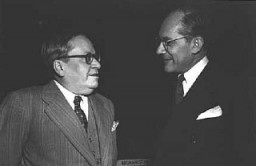
August 28, 1959. On this date, Raphael Lemkin died. He coined the term "genocide" and worked tirelessly for the term to become international law.
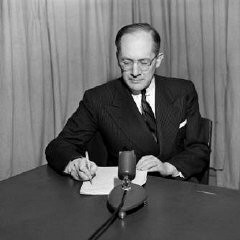
July 9, 2011. On this date, the Republic of South Sudan declared its independence from Sudan.
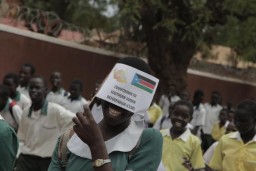
March 4, 2009. On this date, the International Criminal Court (ICC) issued an arrest warrant charging Sudanese President Omar al-Bashir on counts of crimes against humanity and war crimes.
March 17, 2006. On this date, Thomas Lubanga became the first person arrested under an International Criminal Court (ICC) warrant.
July 30, 2006. On this date, the Democratic Republic of the Congo held its first multi-party election in over 40 years.
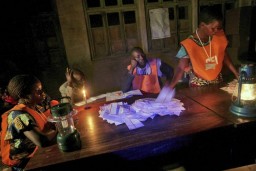
June 23, 2004. On this date, the International Criminal Court (ICC) announced their first investigation which focused on the Democratic Republic of the Congo.
Mordecai Gebirtig, Yiddish folk poet and songwriter, was born in 1877 in Krakow, Poland. Gebirtig was confined in the Krakow ghetto in March 1942. He wrote "Our Springtime" in April 1942. The lyrics describe the bleakness and despair of ghetto life.
Yiddish folk poet and songwriter Mordecai Gebirtig was born in 1877 in Krakow, Poland. He wrote "Shifrele's Portrait" was written in Krakow in December 1939, shortly after the outbreak of World War II. Gebirtig's eldest daughter, Shifre, lived in Lvov, and was separated from her family when the Soviets annexed Lvov. In this brief song, Gebirtig, gazing at his daughter's photograph, imagines himself in conversation with her. She assures him that the war will end soon, and that parent and child will be…
Mordecai Gebirtig, born in 1877 in Krakow, Poland, was a Yiddish folk poet and songwriter. Gebirtig had three daughters, for whom he wrote and performed his poems. The words were set to improvised melodies, and most of his songs resemble entries in a diary. Many of Gebirtig's poems contain themes of eastern European Jewish life in the 1920s and 1930s. The lullaby "Your Kitten is Hungry" dates from the early 1920s. The lyrics, addressed to a hungry child, evoke the themes of hunger and deprivation.
Mordecai Gebirtig, born in 1877 in Krakow, Poland, was a Yiddish folk poet and songwriter. Gebirtig had three daughters, for whom he wrote and performed his poems. The words were set to improvised melodies, and most of his songs resemble entries in a diary. Many of Gebirtig's poems contain themes of eastern European Jewish life in the 1920s and 1930s. The lyrics to "Avreml the Pickpocket" address two social issues, crime and the collapse of family life, arguing that both find their roots in poverty and…
Mordecai Gebirtig, born in 1877 in Krakow, Poland, was a Yiddish folk poet and songwriter. Gebirtig had three daughters, for whom he wrote and performed his poems. The words were set to improvised melodies, and most of his songs resemble entries in a diary. Many of Gebirtig's poems contain themes of eastern European Jewish life in the 1920s and 1930s. The lyrics to "Rejoice, Make Merry, Children" contain a springtime motif that recurred in other Gebirtig works. In the lyrics, an elderly narrator urges…
Yiddish folk poet and songwriter Mordecai Gebirtig was born in Krakow, Poland, in 1877. "Moments of Despair" was written in Krakow in September 1940 on the first anniversary of the German invasion of Poland. The lyrics to this piece comment upon a year of persecution and the uncertainty of the future.
This piece was written in Krakow on October 2, 1940. Mordecai Gebirtig wrote this song to raise the spirits of the persecuted Jewish community in Krakow. The poet's reference to "Haman" alludes to the ancient Persian enemy of the Jewish people.
Mordecai Gebirtig, born in 1877 in Krakow, Poland, was a Yiddish folk poet and songwriter. He wrote "Undzer shtetl brent!" in 1936, following a pogrom in the Polish town of Przytyk. During the war, the song became popular in the Krakow ghetto and inspired young people to take up arms against the Nazis. It was sung in many ghettos and camps, and translated into Polish and several other languages. Gebirtig was killed in June 1942 during a roundup for deportation from the Krakow ghetto. Today, "Undzer…
Erich Frost (1900–87), a musician and devout Jehovah's Witness, was active in the religious resistance to Hitler's authority. Caught smuggling pamphlets from Switzerland to Germany, he was imprisoned in the Sachsenhausen concentration camp near Berlin where he composed this song in 1942. Later deported to a labor camp at Alderney, Channel Islands, Frost survived the war and returned to Germany to serve the Watchtower Society. "Fest steht," reworked in English as "Forward, You Witnesses," is among the…
Musician Erich Frost was a devout Jehovah's Witness active in the religious resistance to Hitler's authority. Frost was caught smuggling pamphlets from Switzerland to Germany and was deported to the Sachsenhausen concentration camp near Berlin. There, he composed this song in 1942. Frost survived the war and died in 1987. This translation is taken from the Jehovah's Witness Songbook. Simone Arnold Liebster, who sings the English version of the song, was born in 1930 in Mulhouse, French Alsace. After the…
Yiddish folk poet and songwriter Mordecai Gebirtig was born in Krakow, Poland, in 1877. In 1940, he was forced to flee from German-occupied Krakow to nearby Lagiewniki. There, in May 1941, he wrote "My Dream"—in which he dreams of peace and revenge. In March 1942 Gebirtig was forced into the Krakow ghetto, where he was killed in June 1942.
Yiddish folk poet and songwriter Mordecai Gebirtig was born in Krakow, Poland, in 1877. In 1940, he was forced to flee from German-occupied Krakow to nearby Lagiewniki. There, in October 1941, he wrote "Tolling Bells"—in which he envisions the end of persecution and occupation.
April 6, 1994. On the date, the Rwandan Genocide began when a plane carrying Rwandan President Juvenal Habyarimana was shot down.

October 23, 2000. On this date, the Rwandan "Media Trial" began, prosecuting members of media involved in the 1994 Rwanda genocide.
November 8, 1994. On this date, the United Nations established the International Criminal Tribunal for Rwanda (ITCR) in Arusha, Tanzania.

July 11, 1995. On this date, the Srebrenica massacre began. Bosnian Serb forces captured the town and killed approximately 8,000 Bosnian Muslims.
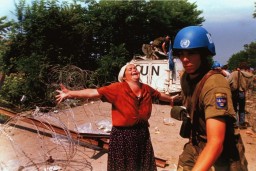
May 25, 1993. On this date, the United Nations Security Council created the International Criminal Tribunal for the Former Yugoslavia (ITCY).
November 21, 1995. On this date, the three-year civil war in Bosnia-Herzegovina ended with a peace agreement negotiated in Dayton, Ohio.
April 22, 1993. On this date, dedication ceremonies for the United States Holocaust Memorial Museum take place.
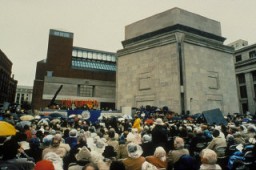
December 15, 1961. On this date, Adolf Eichmann was found guilty of crimes against the Jewish people and sentenced to death.
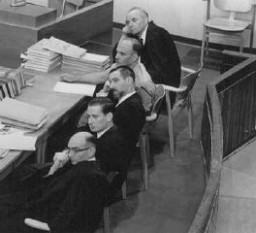
We would like to thank Crown Family Philanthropies, Abe and Ida Cooper Foundation, the Claims Conference, EVZ, and BMF for supporting the ongoing work to create content and resources for the Holocaust Encyclopedia. View the list of donor acknowledgement.